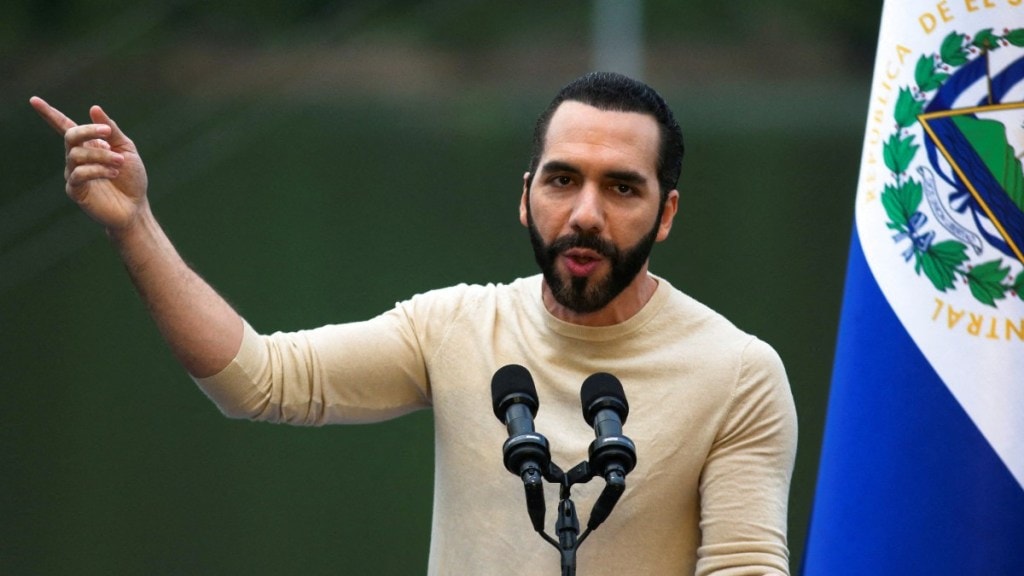For the second time, President Nayib Bukele clinched victory in El Salvador’s election with a staggering 87 percent on February 4, 2024. During his leadership, the country saw a remarkable drop of over 92 percent in homicides, turning El Salvador into one of the safest places in the Western Hemisphere. Despite facing the world’s highest homicide rate, President Bukele successfully transformed his nation into a safer haven by taking strict actions against gangs and crime.
The 42-year-old leader secured a significant win in El Salvador’s elections as voters set aside worries about democracy erosion to commend his robust crackdown on gangs, significantly improving security in the Central American country. Thousands of Bukele’s supporters, dressed in cyan blue and waving flags, gathered at San Salvador’s central square to celebrate his re-election, which he referred to as a “referendum” on his government.
A unique aspect of this election was that, for the first time since the civil war ended in 1992, El Salvador conducted it under a state of emergency, imposed due to Bukele’s crackdown on criminal gangs. While this initiative substantially reduced homicide rates, it faced criticism for violating human rights.
During the election, Bukele, the favourite for another five-year term, campaigned on the success of his gang crackdown, which involved the suspension of civil liberties leading to the arrest of over 75,000 Salvadorans without charges. These arrests contributed to a sharp decline in nationwide murder rates. On election day, Bukele cast his ballot at a voting center in San Salvador before addressing the media.
Expressing confidence, Bukele stated, “So, if we have already overcome our cancer, with metastases that were the gangs, now we only have to recover and be the person we always wanted to be.” He urged citizens to cast their votes and highlighted the unprecedented support his project received, boasting the highest percentage and difference between first and second place in history.
In 2023, just months before the elections, El Salvador hosted the Miss Universe Pageant. Since Bukele assumed power in 2019, he brought about significant changes to the country, home to 6.5 million people. His notable initiative included a decisive war on gangs that had terrorized El Salvador for decades.
Responding to a surge in gang violence in 2022, Bukele suspended some constitutional rights and locked up more than 72,000 people for alleged gang ties without due process. His administration also targeted journalists, labour organizers, human rights groups, and other critical voices, using an extensive communications machine to spread government propaganda.
India & El Salvador
Shifting focus to international relations, Indian travellers heading to El Salvador can obtain a visa on arrival for a maximum stay of 90 days by paying a fee of US$1,000 plus VAT. This rule, effective since October 23, aims to address illegal migration to the United States via Central America. Airlines flying into El Salvador are now required to notify Salvadoran authorities daily about passengers from 57 countries, including India.
Despite the global Covid-19 pandemic, India and El Salvador have strengthened their ties politically, diplomatically, commercially, and economically. While the market in the Central American nation is not large, it has witnessed a significant increase in commercial relationships.
According to a former diplomat, “Even though maybe for India, the market is not as big as some other countries in the region, it doesn’t mean it is not important.” Trade has steadily grown in the last three years, especially in 2021 and 2022, nearly doubling in terms of imports from India. The country is importing various products from India, including textiles, automobiles, pharmaceuticals, medicines, and drugs.
India is becoming a crucial partner for El Salvador, ranking 11th in imports in 2022. This growth is particularly evident in sectors like the automobile industry, textiles, finished products, semi-finalized products, and raw materials. However, it is essential to consider the pharmaceutical sector, where El Salvador is not only an importer but also a producer and exporter in its region.
Looking at the broader Northern Triangle in Central America, there has been some political turmoil and instability. Nayib Bukele’s victory in 2019 marked a significant change in El Salvador. Despite being the youngest leader in the region, he is a popular figure.
El Salvador, Guatemala, and Honduras together form the Customs Union of Central America’s Northern Triangle, representing a market worth US$6.2 billion with a US$134 billion GDP and a customer base of 32.1 million. President Nayib Bukele, recognized as a strong leader in the region, expresses a keen interest in building international relationships, especially with India. Unfortunately, his planned visit to New Delhi in June 2020 was cancelled due to the global COVID-19 pandemic.
In terms of trade, El Salvador is 156 times smaller than India but holds significance in Latin America and the Caribbean (LAC), ranking 15th out of 40 countries to which India exports. Key imports from India include synthetic dyes, medicines, motorcycles, knitted fabrics, and automobiles. The Salvadoran government encourages Indian companies to invest in various sectors, such as energy, aeronautics, textiles, tourism, apparel, light manufacturing, and renewable energy.
Both countries could collaborate in the aerospace sector, especially in Maintenance, Repair, and Overhaul (MRO), which has been steadily evolving. El Salvador is part of the Central American Integration System (SICA), a crucial grouping with eight full members, including Guatemala, Honduras, Nicaragua, Belize, Costa Rica, Dominican Republic, El Salvador, and Panama. The stability under President Bukele’s leadership positions El Salvador as a strategic partner for investment.
In conclusion, President Nayib Bukele’s resounding victory, coupled with the evolving relationship between India and El Salvador, highlights the nation’s commitment to safety, growth, and global partnerships. The potential for increased economic collaboration, diplomatic ties, and cultural exchange sets the stage for a promising future between these two nations.
